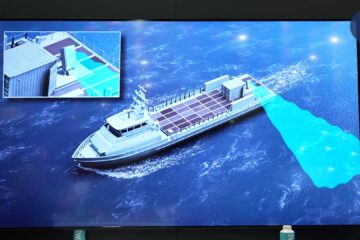Within what US Department of Defense press secretary Major General Patrick Ryder referred to (during a 21 December press briefing) as a ‘coalition of the willing’, the original list of named countries participating in Operation ‘Prosperity Guardian’ – Bahrain, Canada, France, Italy, the Netherlands, Norway, the Seychelles, Spain, and the United Kingdom – now includes Australia and Greece. The coalition also includes contributors that have not been named.
“We expect to see the coalition continue to grow,” said Maj Gen Ryder.
The task force commenced operations on 18 December. Announcing the move, US Secretary of Defense Lloyd Austin said ‘Prosperity Guardian’ – established under the US Navy-led, 39-member Combined Maritime Forces (CMF) maritime security partnership, and commanded by CMF’s US Navy-led, Red Sea-focused Combined Task Force (CTF) 153 – is designed to deliver safe passage for merchant shipping using the southern Red Sea and the Gulf of Aden, plus the Bab-el-Mandeb straits connecting them.
Describing the situation as an escalating threat to the free flow of commerce and the maintenance of international law, Austin said the task force will bring collective action to “jointly address security challenges … with the goal of ensuring freedom of navigation for all countries, and bolstering regional security and prosperity”. “Countries that seek to uphold the foundational principle of freedom of navigation must come together to tackle the challenge posed by this non-state actor launching ballistic missiles and uncrewed aerial vehicles (UAVs) at merchant vessels from many countries lawfully transiting international waters,” Austin continued.

Since mid-October, commercial ships sailing in the region have been at risk of attack by Ansar Allah (Houthi) rebels operating in southwestern Yemen. Attacks have been in the form of attempted hijackings and – increasingly – maritime strikes using UAVs or anti-ship ballistic and cruise missiles (ASBMs, ASCMs). Reflecting the situation’s position within the wider Middle East security crisis developing since the Israel/Hamas war erupted on 7 October, the Houthi rebels’ stated aim is to target ships they believe to be visiting Israeli ports.
Reflecting too the international importance of securing Red Sea shipping, Maj Gen Ryder said “This is an international problem and requires an international response.” The growing number of participating countries are providing a range of contributions, including ships, aircraft, staff personnel, and other types of support. “By virtue of it being a coalition of the willing, countries can provide what they feel they can contribute, based on their national priorities and national domestic decisions,” said Maj Gen Ryder.
Deterrence is the essence of the operation. ‘Prosperity Guardian’ will increase military presence to discourage rebel attacks on shipping.
“To counter this specific threat to the global economy, we will surge international presence in the Red Sea and Gulf of Aden – on the sea and in the air,” CMF stated, in a ‘Prosperity Guardian’ fact sheet. “A swift and unified response demonstrates our international resolve.” “International naval forces will patrol the Red Sea and Gulf of Aden, providing assurance to the maritime industry, [and] deterring illegal activity and the threat to safe navigation and international freedoms,” CMF added.
CMF noted that the ‘Prosperity Guardian’ task force will co-ordinate with other task forces.
“The forces assigned to ‘Prosperity Guardian’ will serve as a highway patrol of sorts, patrolling the Red Sea and Gulf of Aden to respond to and assist as necessary commercial vessels transiting this vital international waterway,” said Maj Gen Ryder. “It’s a defensive coalition meant to reassure global shipping and mariners that the international community is there to help with safe passage.”
About operation Prosperity Guardian

In command terms, ‘Prosperity Guardian’ will operate under the existing CTF 153/CMF construct. CTF 153 is an at-sea command, supported by CMF staff ashore in Bahrain. In this sense, ‘Prosperity Guardian’ is not a new operation, but an application of CTF 153 resources to provide a focus of effort at a particular time in a particular operational space. A ship could contribute to ‘Prosperity Guardian’ by operating as part of CTF 153, or else by operating in partnership alongside it.
With ‘Prosperity Guardian’ ‘nested’ under CTF 153, “Countries have a framework now upon which to pull together and address these [requirements] together,” said Maj Gen Ryder.
Prior to the establishment of ‘Prosperity Guardian’, ships from three navies – the US Navy, French Navy (Marine Nationale), and UK Royal Navy – had conducted operations to protect commercial ships from attack. These ships all demonstrated robust air-defence capability. For example, US Central Command (CENTCOM) reported that the US Navy DDG 51 Arleigh Burke-class destroyer USS Carney successfully engaged a wave of 14 UAVs on 16 December. Other ships operating within or alongside CTF 153 bring organic air-defence capability. Ships participating in ‘Prosperity Guardian’ operate under their own national mandates. As the ‘Prosperity Guardian’ task force commenced operations, attempted attacks continued. On 18 December, CENTCOM reported a UAV and ASBM attack on the tanker MV Swan Atlantic in the Red Sea; Carney responded. Separately, CENTCOM said the bulk cargo ship MV Clara had reported an explosion in the water near its position. Incidents were occurring south of Bab-el-Mandeb, too. On 19 December, the UK Maritime Trade Organisation (UKMTO) – an RN-hosted information conduit between commercial shipping and military/security forces – reported that UAVs and possible boarding parties were operating southeast of the straits.






